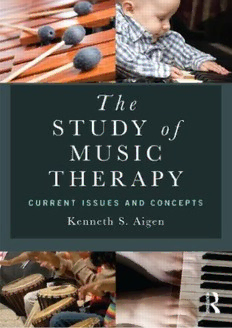Table Of ContentTHE STUDY OF
MUSIC THERAPY
This book addresses the issues in music therapy that are central to understanding it in its
scholarly dimensions, how it is evolving, and how it connects to related academic disciplines.
It draws on a multi-disciplinary approach to look at the defining issues of music therapy as
a scholarly discipline, rather than as an area of clinical practice. It is the single best resource
for scholars interested in music therapy because it focuses on the areas that tend to be of
greatest interest to them, such as issues of definition, theory, and the function of social context,
but also does not assume detailed prior knowledge of the subject.
Some of the topics discussed include defining the nature of music therapy, its relation to
current and historical uses of music in human well-being, and considerations on what makes
music therapy work. Contemporary thinking on the role of neurological theory, early
interaction theory, and evolutionary considerations in music therapy theory are also reviewed.
Within each of these areas, the author presents an overview of the development of thinking,
discusses contrasting positions, and offers a personalized synthesis of the issue. The Study of
Music Therapy is the only book in music therapy that gathers all the major issues currently
debated in the field, providing a critical overview of the predominance of opinions on these
issues.
Kenneth S. Aigen is an associate professor in music therapy at New York University. He
is president of the Nordoff-Robbins Music Therapy (NRMT) Foundation and the Inter -
national Trust for NRMT. He is a past president of the American Association for Music
Therapy and a recipient of the Research and Publications Award from the American Music
Therapy Association.
This page intentionally left blank
THE STUDY OF
MUSIC THERAPY
Current Issues and Concepts
Kenneth S. Aigen
New York University
First published 2014
by Routledge
711 Third Avenue, New York, NY 10017
and by Routledge
2 Park Square, Milton Park, Abingdon, Oxon OX14 4RN
Routledge is an imprint of the Taylor and Francis Group, an informa business
© 2014 Taylor and Francis
The right of Kenneth S. Aigen to be identified as author of this work has
been asserted by him in accordance with sections 77 and 78 of the Copyright,
Designs and Patents Act 1988.
All rights reserved. No part of this book may be reprinted or reproduced or
utilised in any form or by any electronic, mechanical, or other means, now
known or hereafter invented, including photocopying and recording, or in
any information storage or retrieval system, without permission in writing
from the publishers.
Trademark notice: Product or corporate names may be trademarks or registered
trademarks, and are used only for identification and explanation without intent
to infringe.
Library of Congress Cataloging in Publication Data
Aigen, Kenneth S., author.
The study of music therapy: current issues and concepts/Kenneth S. Aigen.
pages cm
Includes bibliographical references and index.
1. Music therapy—Research. I. Title.
ML3920.A173 2014
615.8′515407—dc23
2013025941
ISBN: 978-0-415-62640-8 (hbk)
ISBN: 978-0-415-62641-5 (pbk)
ISBN: 978-1-31588-270-3 (ebk)
Typeset in Bembo and Stone Sans
by Florence Production Ltd, Stoodleigh, Devon, UK
Senior Editor: Constance Ditzel
Editorial Assistant: Elysse Preposi
Production Manager: Bonita Glanville-Morris
Marketing Manager: Cedric Sinclair
Project Manager: Kelly Derrick
Copy Editor: Thérèse Wassily Saba
Proofreader: Etty Payne
Cover Design: Lisa Dynan
This work is dedicated to Clive Robbins,
a giant of a man and a visionary whose recent
passing has both cast a shadow upon and
inspired the present work.
This page intentionally left blank
CONTENTS
List of Tables ix
Preface xi
Acknowledgments xvi
Introduction xvii
PART I
What is Music Therapy? 1
1. The Identity of the Music Therapy Profession 3
2. The Identity of the Professional Music Therapist: Roles and
Related Disciplines 17
PART II
How is Music Considered in Music Therapy? 35
3. Psychodynamic, Social, and Music-Centered Perspectives
on Music 37
4. Musical Styles in Music Therapy: Culture, Identity, and
the Nature of Change 51
5. The Medium of Music and Clinical Goals 63
6. The Relationship between Clinical and Nonclinical
Music 75
viii Contents
PART III
How are the Nonmusical Aspects of Music Therapy
Considered? 89
7. The Role of Verbalization in Music Therapy 91
8. The Client–Therapist Relationship in Music Therapy 107
PART IV
How does Music Therapy Relate to other Uses of
Music in Society? 119
9. Music Therapy and Traditional Healing Practices:
Definitional Issues 121
10. Music Therapy and Traditional Healing Practices:
Clinical Applications 132
11. Community Music Therapy: Origins and Definitional Issues 146
12. Perspectives on Performance in Community Music Therapy 157
PART V
How are Psycho-Biological Concerns Addressed in
Music Therapy? 169
13. Early Interaction Theory and Music Therapy 171
14. Neurological Science and Music Therapy 188
15. Evolutionary Theory and Music Therapy 197
PART VI
How is Music Therapy Theory Developing? 215
16. An Overview of Current Music Therapy Frameworks 217
17. A Comparative Analysis of Current Music Therapy Frameworks 232
Conclusion 245
References 249
Author Index 258
Subject Index 260
TABLES
16.1 Three Stages of Development in Models of Music Therapy and
Associated Theory 218
16.2 Stage Three Music Therapy Orientations Presented Chronologically 220
16.3 Characteristics of Stage Three Orientations 222

